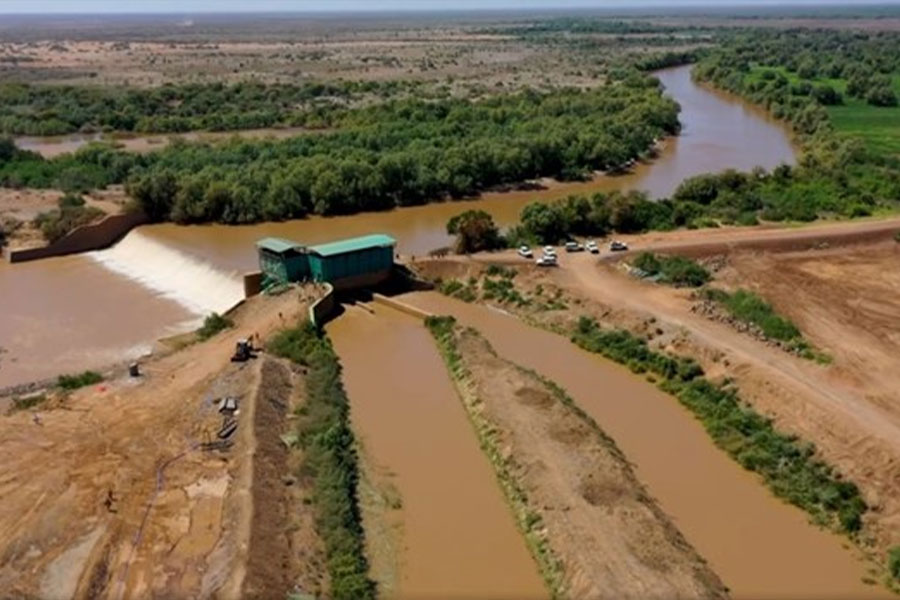
Fortune News | Dec 10,2018
Horizon Addis Tyre, a subsidiary of the MIDROC conglomerate, has begun making tyres for military vehicles and for road graders with an investment of 187 million Br.
The new types of tyres were launched last week as part of the company's plan of launching four new types of tyres this fiscal year. It took the company seven months to design, develop and test the new patterns of the tyres before availing them to the market.
The new production line has a capacity of making 10,000 grader and 5,000 military vehicle tyres a year.
Formerly known as Matador Addis Tyre, the company also launched a new batch of tyre products for three-wheel and four-wheel passenger vehicles two months ago.
It also started supplying forklift tyres to Ethiopian Airlines, which uses forklifts to carry luggage from the conveyor to aeroplanes and vice-versa. The airline had been buying the tyres from Michelin Group, a French company that designs, manufactures and distributes Michelin brand tyres globally.
After the airline tasted the product, they gave Horizon Addis a green light to manufacture the tyres for their forklifts, according to Akalewolde Admasu, CEO of Horizon Addis, which operates under Horizon Plantation Plc, a special arm of MIDROC.
The company, which has annual revenues of over one billion Birr, started making tyres for graders three years ago along with agricultural truck tyre patterns.
However, it could not break into the market, since the market was dominated by Chinese and Indian suppliers that provided stiff competition, according to Akalewolde.
A single imported grader tyre is sold for 35,000 Br to 42,000 Br in the market; however, Horizon will sell them for 18,000 Br starting this week, according to the general manager.
The Ethiopian military force, which has been using tyres imported from Russia, has already started testing the new Horizon tyre for military trucks, according to Akalewolde.
Flotation and Bajaj tyres were exported to Kenya for the third time, and the company is in the process of exporting these tyres to Sudan, according to Dawit Demilie, commercial manager of Horizon.
Established over three decades ago, Horizon makes flotation tyres for trucks that are used by sugar companies. Since 2018, the company has been supplying tyres to the Sugar Corporation, which had been previously importing them from Poland.
Only in this fiscal year, Horizon supplied 82 million Br worth of tyres to the Sugar Corporation, according to Akalewolde.
Importing 90pc of the raw materials like carbon black, sulfur and other chemicals from Egypt and China, Horizon has the capacity to make 800,000 tyres a year but currently makes 650,000 tyres. It largely makes tyres for fast and usually overloaded trucks like Isuzus, as well as minibuses.
Before getting its current name and owner, the company previously had a different name and ownership. Slovak Matador Tyre bought a 61pc stake of the company in 2004 and renamed it Matador Addis. Four years later, Matador sold half of its shares to the German-owned company Hanover.
In 2011, Horizon Plantation, which was established in 2009, bought the shares of the two companies as well as the remaining shares owned by the government. After acquiring the plant, Horizon Plantation invested 800 million Br in the tyre making company.
Horizon, which makes 75 types of tyres, is finalising a feasibility study to open an additional plant with a minimum capacity of manufacturing 1.4 million tyres annually, according to Akalewold.
"We've got a vision that aims to cover 60pc of the local demand and export 10pc of our production by 2025," said Akalewolde.
Mulugeta Geber-Medhin (PhD), an assistant professor at Addis Abeba University's School of Commerce & Marketing Management, foresees demand for the company's products growing in the coming years.
The number of cars in the country is still below other Sub-Saharan countries and the need for cars will increase in the coming years, according to Mulugeta.
Currently, the country has approximately 1.1 million cars, of which over half are located in the capital city. About 85pc of imported vehicles nationally are second-hand.
He also says that the latest excise tax, which imposed a higher tax on used imported vehicles, will encourage new assemblers to invest in the country.
“To be competitive in the market," said Mulugeta, "the company should focus on quality and affordable price."
PUBLISHED ON
Feb 15,2020 [ VOL
20 , NO
1033]

Fortune News | Dec 10,2018

Radar | Mar 07,2020

Radar | Sep 28,2019

Radar | May 06,2023

Fortune News | Sep 27,2020

Radar | Mar 28,2020

Fortune News | Jun 12,2025

Radar | May 16,2020

Radar | Sep 23,2023

Radar | Jan 15,2022

Dec 22 , 2024 . By TIZITA SHEWAFERAW
Charged with transforming colossal state-owned enterprises into modern and competitiv...

Aug 18 , 2024 . By AKSAH ITALO
Although predictable Yonas Zerihun's job in the ride-hailing service is not immune to...

Jul 28 , 2024 . By TIZITA SHEWAFERAW
Unhabitual, perhaps too many, Samuel Gebreyohannes, 38, used to occasionally enjoy a couple of beers at breakfast. However, he recently swit...

Jul 13 , 2024 . By AKSAH ITALO
Investors who rely on tractors, trucks, and field vehicles for commuting, transporting commodities, and f...

Jun 28 , 2025
Meseret Damtie, the assertive auditor general, has never been shy about naming names...

Jun 21 , 2025
A well-worn adage says, “Budget is not destiny, but it is direction.” Examining t...

Jun 14 , 2025
Yet again, the Horn of Africa is bracing for trouble. A region already frayed by wars...

Jun 7 , 2025
Few promises shine brighter in Addis Abeba than the pledge of a roof for every family...